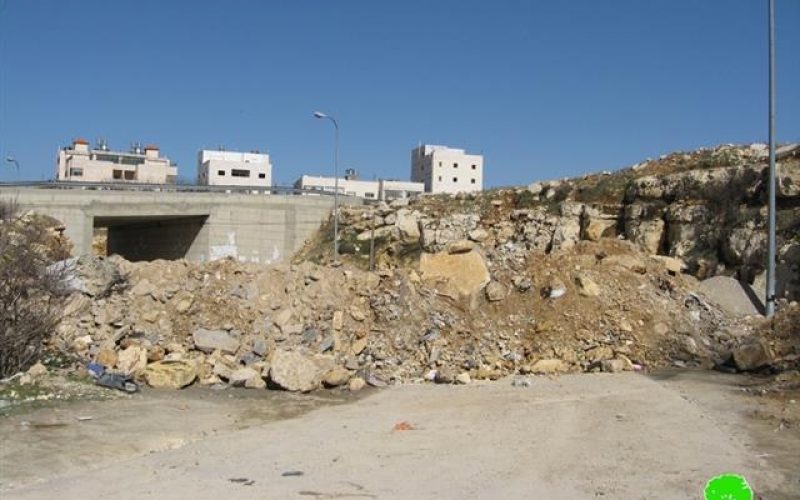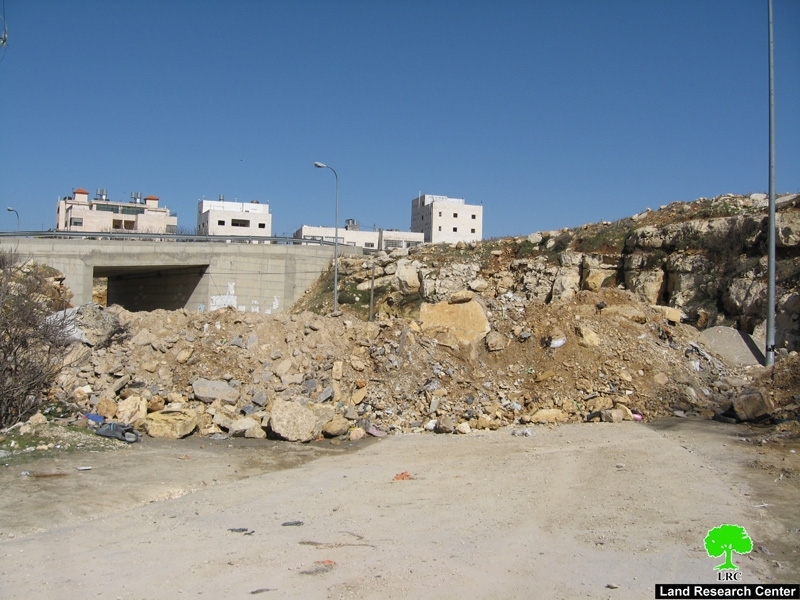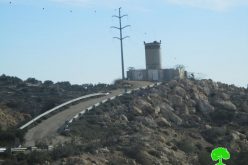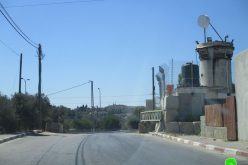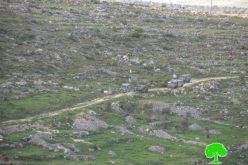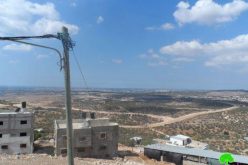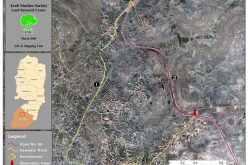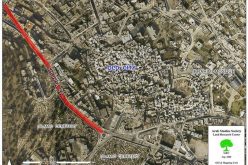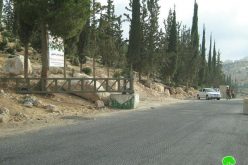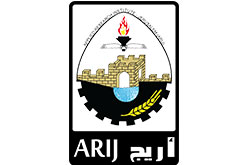Mrs. Majida Al Ja'afrah was obligated to give birth at the Beit Kahil earthmound inside the car of her husband, Mohammad, after she was blocked from reaching the governmental hospital in the city of Hebron. The earthmound was put in place by the Israeli occupation forces to block the road connecting between the city of Hebron and the towns of Beit Kahil and Tarqumiya.
The baby, named Laith Mohammad Ja'afrah from the village of Tarqumiya, is a living testimony of the Israeli violation of all basic human rights. The mother waited for an extended period of time for the Palestinian ambulance to arrive to accompany her to the hospital. Yet, the ambulance could not reach her before she gave birth inside the car of her husband. Upon arrival, Mrs. Ja'afrah was transported into the ambulance which sped to the hospital.
The Land Research Center's field researcher met with Mrs. Ja'afreh. She told the researcher that she had labor pain at 7:30 AM. In turn, her mother, mother-in-law and husband used their private car and headed from their village of Tarqumiya to Alia Governmental Hospital in Hebron City through the Beit Kahil Underpass. However, Mrs. Ja'afrah was prevented from reaching her destination while another 57,000 Palestinians who were denied access to the services center in Hebron City.
The 21-year old Majida related the following to the field researcher: ' At 7:30 AM of June 26th, 2008 I started to feel the labor pain. My husband placed me in his car, along with my mom and his mom, as he started heading towards the city of Hebron. We did not know then that the Beit Kahil Underpass was blocked. We reached the Underpass at 9:00 AM only to be surprised that it was blocked with a huge earthmound. By that time, I could not handle the pain any more and the delivery process had already started. The baby has started to come out. I was really afraid and concerned about him as he was turning blue. When my husband saw me at that stage he became worried about my life and the life of the baby. He didn't know what to do as he kept on looking at me for a while and looking at the baby for another while. Those were really heavy moments that I won't forget for the rest of life. Finally, the ambulance showed up at 10:30 AM. Yet, it was too late as I have already given birth to my baby boy. The ambulance transported me to Hebron's Governmental Hospital where I was attended to by the emergency room staff who cut the empirical cord for Laith and took care of him and me afterwards.'
Dr. Sa'eed Sarahna, the Director of Hebron's Governmental Hospital gave the following testimony for LRC's field researcher: 'Mrs. Majida arrived at the hospital while her newly-born baby was still attached to her via the empirical cord. It was immediately cut upon arrival at the hospital. I can tell that she was really afraid throughout the whole journey.'
The case of Mrs. Majida is not unique. Tens of other cases of giving birth at Israeli checkpoint and closures were reported throughout the years of the current Intifada. The babies that were born there will never forget that occupation practically means the death of the freedom of movement.
The LRC has documented similar cases in the city of Jerusalem including the case of Mrs. Anwar Al Rifa'I, a resident of Anata, who gave birth to a baby girl on March 6th, 2006 at a gate in the Israeli Racist Isolation Wall. Another case took place at 7:30 AM on the 29th of July 2007 when Umm Aisha was obligated to give birth to her baby girl, Aisha, in a car at yet another gate in the Wall near Shu'fat refugee camp while en route to Al Makased Hospital.
Beit Kahil Underpass:
The Beit Kahil Road used to be the main road connecting between the City of Hebron and the town of Beit Kahil as well as to Wadi Al Quff Road. In 1996, Israeli occupation forces re-routed the road and shrunk it to a mere 6-meter wide entry point surrounded by cement basis with a height of 5 meters. Atop the concrete, a new colonial road (Road 35) was established to connect between the colonies of Kiryat Arab Kharsina with the colonies of ADora and Telem and then into the Israeli proper.
Photo 1: The closure at Beit Kahil Underpass.
The Underpass is the only direct road that connects between the towns of Idhna (pop.: 20,000), Tarqumiya (pop.: 15,000), Beit Ula (pop.: 10,000), Nuba (pop.: 4,000) in addition to the villages of Al Jora, Qila, Tawas and Hatta with a combined population of around 3,000 Palestinians. As such, the Underpass is used on daily basis by about 57,000 people who depend entirely on the services provided by the governmental and non-governmental organizations in the city of Hebron.
The Land Research Center declares that constraints enforced by the Israeli occupation against the Palestinian citizens and establishing military checkpoints that impede movement and freedom of movement is considered a flagrant violation of Article (13) clause (1) of the Universal Declaration of Human Rights issued in 1948 which states that: 'Each individual has the right to leave any country, including his own, and the right to return back to it.
Prepared by:
The Land Research Center
LRC


